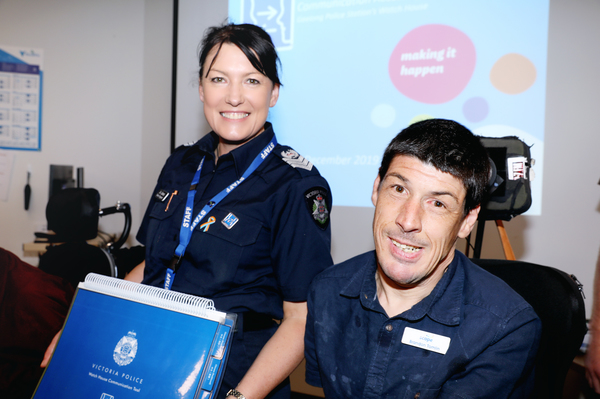Geelong Police Station has received a nationally-recognised accreditation for its officers working with people that have communication difficulties.
On Wednesday the station officially joined more than 200 other Victorian organisations to receive the Communication Access Symbol from not-for-profit disability provider Scope.
“Geelong Police Station will now proudly display the symbol in the watch house,” Senior Sergeant Jo Janes said.
“It demonstrates to the community that our officers have the skills and strategies to effectively and respectfully interact with people who have communication difficulties.”
The nature of police work meant officers regularly came into contact with people of varying communication abilities, Sen Sgt Janes explained.
“This means that we must provide a needs-based service that promotes fairer outcomes for people with communication difficulties,” she said.
“Officers have worked hard to earn this recognition, participating in tailored training sessions, and speaking openly and genuinely to trainers with lived experiences.
“More importantly, they are now better equipped with the skills and confidence to communicate effectively with community members who have communication difficulties both in person and on the phone.”
The accreditation follows a comprehensive two-year program at the station and Victorian Equal Opportunities and Human Rights Commission’s 2014 findings on how disabled people report crime.
The commission’s Beyond Doubt Report found that people with communication disabilities faced considerable barriers at all points in the criminal justice system.
“We know that walking into a police station to report a crime can be intimidating,” Sen Sgt Janes said.
“We hope this symbol offers confidence to anyone who walks into a police station to know that they will receive fair and equal access to our services.”
Geelong officers who participated in the training would now wear a Communication Access pin, Victoria Police announced.
The pin would signal they had skills and strategies to communicate effectively with people with communication difficulties, police said.
A National Disability Insurance Scheme grant made the program possible, according to police.
Communication Access worker Brandon Tomlin praised Geelong police for completing the program and described the ability to communicate with authorities as a human right.
Mr Tomlin, who has communication difficulties, spoke at the announcement through the use of a chart and an interpreter.









